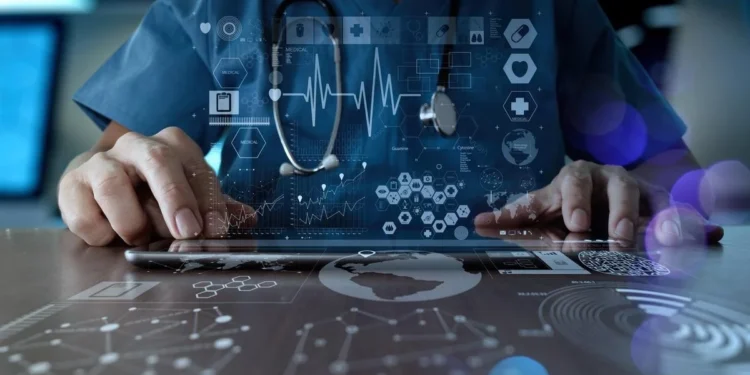Today’s healthcare system is mired in bureaucracy, overstressed providers, and an abundance of waste. The Institute of Healthcare Improvement ranked healthcare as the fourth most urgent problem for the American public. The future of healthcare requires a shift from reactive care to proactive prevention.
This future will require advances in technologies that will help drive a revolution in medical care. To bring about this revolution, we need tech-savvy software developers who understand how artificial intelligence (AI) can transform how we interact with technology. If you are passionate about working on healthcare software solutions, read on to learn more about what it takes to become a developer in this field today.
What is a Software Developer?
A software developer creates software, i.e., computer applications, websites, or services. You might be surprised to learn that not all developers create computer programs. A software developer could also be in marketing, finance, or operations. Developers write code that tells computers what to do.
They build software including apps for smartphones and other devices, computer hardware and software, and the Internet. It’s important to note that developers are not necessarily programmers. Some developers are more involved with coding and writing code than others, but all developers are responsible for the structure and function of their software.

What Is AI?
Artificial Intelligence (AI) is the concept of machines that can perform human-like tasks and make decisions. AI is a subset of machine learning, a branch of computer science that is concerned with the design and analysis of algorithms that are used to solve problems.
It’s also known as the science of getting computers to make logical decisions. AI has many applications like voice assistants, self-driving cars, and healthcare software like an automated reminder to take your medicine.
How To Become a Software Developer?
A programming career can be exciting and rewarding, but it can also be challenging and even lonely. To overcome those challenges, one must diligently seek out training programs and networking opportunities. With the right combination of preparation and perseverance, you can become a successful developer.
- Advanced degrees in computer science or related fields – Since the demand for developers is projected to increase, it is important to have a degree in computer science or related fields.
- Graduate school or post-degree training – After completing your degree, it is important to seek out advanced training programs to stay on top of the latest developments. Continual training will allow you to avoid becoming obsolete and give you a competitive edge when hiring employers.
- Networking and professional associations – One of the best ways to keep up to date with the latest developments and best practices is by participating in professional associations and finding training programs that partner with similarly minded organizations.
- Maintain a strong portfolio – A strong portfolio will help employers see the level of skill you have. It can be as simple as past projects that demonstrate your ability to solve real-world problems.
- Be ready to work hard – The programming world can be competitive, but it is also the most rewarding career path. The best way to stay competitive is by staying focused on the task at hand and putting in the hard work.

Sample Career Paths for a Software Developer in Healthcare
Healthcare software is growing in popularity as more hospitals and healthcare facilities implement electronic health record systems. The growth of healthcare-related software development also impacts the healthcare industry. Healthcare software developers who work in this field are expected to work with a variety of technologies to create software solutions for a variety of businesses. The types of healthcare-related software development you can pursue include:
Clinical Decision Support Software – Teams of healthcare software developers work with physicians, nurses, and other healthcare professionals to provide decision support tools.
Electronic Health Record Systems – This type of software is designed to create a single view of patient data. The resulting data could be used to improve patient outcomes by reducing inappropriate treatments, improving the timeliness of care, and reducing the risk of medical errors.
IT Performance Management Systems – Performance management systems are designed to help IT professionals understand how their solutions are performing and identify areas for improvement.
Patient Safety and Patient Care Analytics – Developers create solutions that help healthcare providers identify best practices for patient safety, determine appropriate treatment modalities, and create real-time insights for medical decisions.
Telehealth and Remote Care Software – Developers create solutions that help healthcare providers provide timely care to patients who live far from healthcare facilities.

JavaScript and Python Programming Languages
Artificial Intelligence requires a programming language with which to run calculations. Researchers are discovering that machine learning is best to run on a CPU, which makes the JavaScript programming language a popular choice. Another popular choice is Python, a high-level programming language that is often used for implementing complex algorithms.
These programming languages are also used to create web applications and mobile apps, which can be accessed by computers or smartphones.
Conclusion
The future of healthcare will be driven by technological advancements in AI and ML. Advancements in these areas will lead to better healthcare outcomes and an easier experience for patients. With these advancements, the role of software development will be crucial. The best way to prepare for this future is to pursue a career in programming now.
























